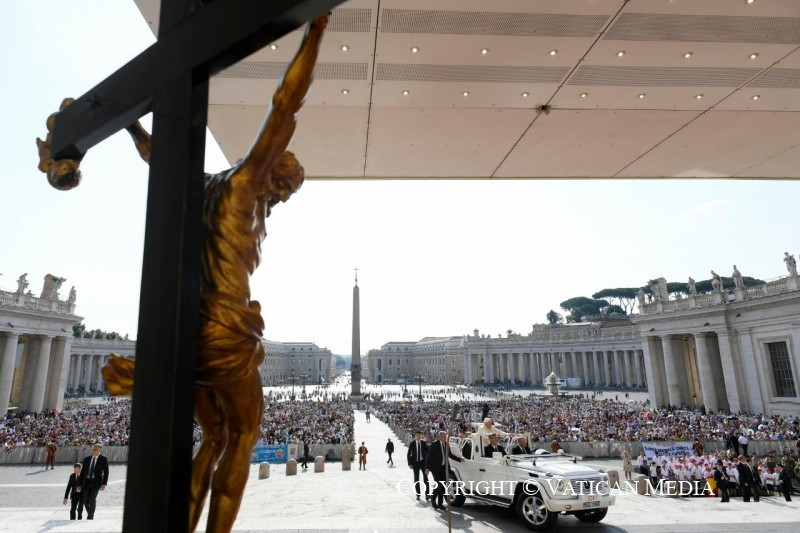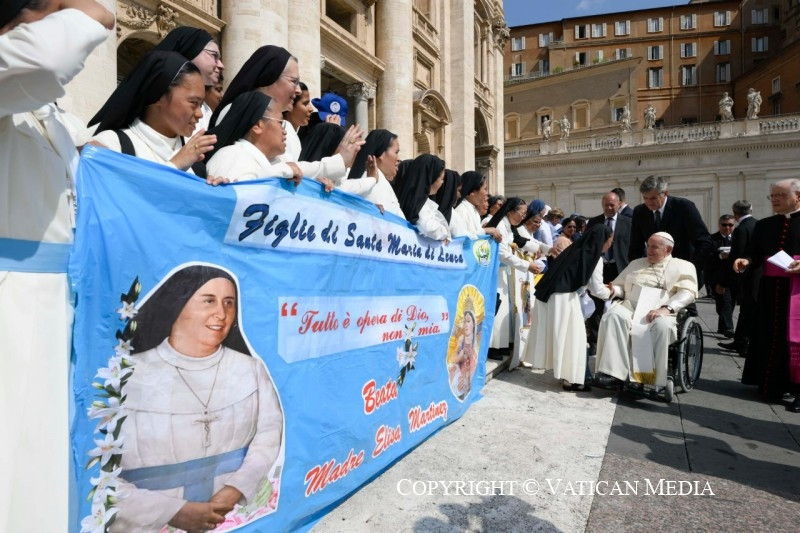We publish the translation of the complete catechism of Pope Francis.
Dear brothers and sisters, I wish you a good day!
Today we have to bear this colossal heat a little bit! Thank you for coming in this heat, in this strong sun! Thank you very much for visiting!
In this series of catechisms on apostolic zeal, we meet exemplary men and women who gave their lives for the gospel in different times and places. Today we are going far, far into Oceania, a continent made up of many small and large islands. The faith in Christ, which many European immigrants had brought with them to those lands, soon took root and bore abundant fruit (cf. St. John Paul II: Ecclesia in Oceania Apostolic homily after the Synod, 6). Among these extraordinary Sisters is St. Mary MacKillop (1842-1909), founder of the Conventual Institution of the Sisters of St. Joseph of the Sacred Heart, who devoted her life to the spiritual and religious formation of poor rural people in Australia.
Mary McKillop was born near Melbourne to parents who emigrated from Scotland to Australia. As a little girl, she felt called by God not only by word and witness to Him, but above all by her life transformed by God’s presence (cf. Evangelii Gaudium, 259).
Like Mary Magdalene, who first met the resurrected Jesus and was sent by Jesus to inform the disciples of the news of his resurrection, Mary was also convinced that she too was entrusted with the task of spreading the good news and bringing others to the living. God draws to meet.
Wisely interpreting the signs of the times, he recognized that the best way to do this was to educate the youth, knowing that Catholic education is a form of evangelization. Great form of evangelism! If we could say that “every saint is a special message: the Father’s plan to reflect on and embody an aspect of the Gospel at a particular moment in history” (Gaudete et exultate Apostolic Exhortation, 19), and then Mary MacKillop did this especially by establishing schools.
An essential feature of his zeal for the gospel was his concern for the poor and the excluded. This is very important:
On the path of holiness of life, which is the path of Christians, the poor and the excluded are champions, and one cannot advance in the sanctity of life if one does not dedicate oneself to them in one way or another.
Those who need the Lord’s help bear the Lord’s presence. I once read a sentence that shocked me. It sounded like this: “The hero of history is the beggar: the beggars draw attention to the injustice, to this extreme poverty in the world.” Money is spent on making weapons, not making food. Do not forget: there is no sanctity to life if we do not care for the poor, the needy, and the fringes of society in one way or another. This concern for the poor and marginalized led Mary MacKillop to go where others could not or could not go. On March 19, 1866, Saint Joseph’s Day, he opened the first school in a small coastal settlement in South Australia. This was followed by many other schools that she and her sisters opened for rural people in Australia and New Zealand. Schools multiplied, because apostolic zeal results in: Institutions multiplied.
Mary MacKillop was convinced that the purpose of education is the full development of the individual as an individual and as a member of society, and that this requires wisdom, patience, and love on the part of every teacher.
Education isn’t just about stuffing students’ heads with ideas: no, it’s not just about that. So what does it stand for? Accompanying and encouraging students on the path of human and spiritual growth, we show them how friendship with the risen Christ enlarges the heart and makes life more human. Teaching means helping someone Think well I feel good (the language of the heart) f I do well (the language of the hands). This point of view is very relevant today, when we feel the need for an “educational charter” that could unite families, schools and society as a whole.
Mary MacKillop’s zeal for spreading the gospel among the poor led to the start of other charitable institutions, beginning with the Providence House in Adelaide, which was used to receive the elderly and abandoned children.
Mary had a deep faith in God’s providence: she always trusted that God would provide for her in every situation.
However, this did not spare him from the worries and difficulties arising from his message. And Mary had good reason to trust Divine Providence: she had to pay the bills, negotiate with the local bishops and priests, run the schools, and take care of the vocational and spiritual training of her sisters; And then he had to deal with serious health problems. Despite all this, he remained calm, patiently carrying the cross, an integral part of the mission.
On one occasion, at the Feast of the Exaltation of the Cross, Mary said to one of her sisters: “My daughter, I learned many years ago to love the cross.” He did not give up in times of misfortune, when the sky was overcast, when opposition and disapproval tried to take away his joy from him. You can see: every saint has encountered resistance, even within the Church. interesting. He also met her. He remained convinced of that
When the Lord gave him “the bread of poverty and the water of trouble” (Is. 20:30), it was the Lord Himself who immediately responded to his cry and surrounded him with His grace.
This is the secret of apostolic zeal: continuous contact with the Lord.
My brothers and sisters, may St. Mary MacKillop’s apostolic discipleship, her creative response to the needs of the church in her day, and her commitment to the wholesome education of young people inspire all of us today who are called to be leaven. The gospel in our rapidly changing society. May his example and intercession support the daily work of parents, teachers, catechists and all educators, for the benefit of young people, for a more humane and hopeful future!
Translated by: Endre Tozser SP
Photo: vatican.va
Hungarian Post
















































